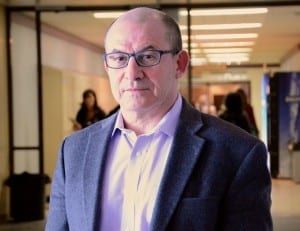From prisoner to professor

Miguel Sanchez describes his journey from Pinochet’s Chile to Canada
Author: Jeremy Simes – Contributor

University of Regina Associate Dean of Social Work Miguel Sanchez reflects on his years as a political prisoner in Chile. / Jeremy Simes
As police stopped a bus making its way to Chile’s capital, Santiago, Miguel Sanchez sat tensely inside. He knew what was about to happen. There—February 1974, the beginning of the Augusto Pinochet regime—he and his two brothers were arrested.
It all began when the CIA-backed military coup bombed the country’s presidential palace on Sept. 11, 1973, marking the end of the democratically elected Salvador Allende government. Tens of thousands of Chileans—including Sanchez—would become political enemies overnight for supporting Allende.
Hunted down and imprisoned, the political prisoners became part of routine torture sessions. The guards followed a procedure: place the prisoner in a small cell, call him out, blindfold him, spin him, ask him to walk, hit him.
Afterward, remove his clothes, sit him on a chair, place electrodes on parts of his body—especially their genitals—ask questions, apply voltage if needed. That’s what Sanchez remembered.
But his cellmates braved much worse, he said during a recent interview at the University of Regina.
Now the associate dean of social work at the U of R, Sanchez’s drive to improve Canada’s welfare system stems from life as a prisoner and a mentor for many in Regina’s Chilean community, who felt the psychological after-effects of their trauma.
Jail also had its ups, he said. For the political prisoners, a communal environment flourished, where they cleaned and painted their cells, played soccer and studied famous thinkers. When people returned from a torture session, Sanchez and his cellmates would help relieve their pain.
“We were able to create our own environment that was way more humane,” he said. “There was lots of solidarity.”
Throughout the Pinochet regime, Canada accepted 7,000 Chilean and other Latin American refugees. The decision was considered controversial at the time, as the government feared most refugees were too left-wing. Also, the government didn’t want to alienate the new Chilean leader.
According to the Chilean government, more than 40,000 people were killed, tortured or imprisoned during the regime. Sanchez said Canadian representatives approached him in prison, telling him he was well suited to reside in Canada once he completed his sentence.
Released in 1976, he had a choice: quietly remain in Chile or seek refuge in Canada.
“At the time, the secret police was no longer putting people in jail. Instead, people were disappearing,” he said. “I did not feel secure.”
Accordingly, he approached the Canadian embassy in Santiago. At first, Sanchez was to be sent to Quebec, then Winnipeg. This time, he had no choice. Regina was the answer.
It was as if the same community detained in Chile migrated to the prairies, Sanchez said.
Psychologically damaged, the refugees managed to thrive within the Chilean community, reaffirming their identity. But outside the inner circle, things were tough.
“You couldn’t aspire to have a job you wanted to have,” Sanchez said. “There were only certain jobs you could access, particularly labour jobs. That was hard for me because I wanted to go to university.”
Sanchez would eventually see that materialize, working full-time while taking one class per semester on the side.
At last, he completed a degree in economics and sociology at the University of Regina. But Sanchez wanted more. While doing his degree in clinical psychology, Sanchez recognized painful memories persisted in the Chilean community. Nobody received professional counseling.
“They had been tortured. And that wasn’t acknowledged as being an important event in their life.”
In Regina, Sanchez said Chileans were afraid of police officers, experienced persistent headaches, had high sensitivity to light or lack of light, and had stomach problems.
Still, a degree in psychology wasn’t the answer.
“I don’t believe in the perfect ability of the individual,” he said. “But, I believe in the perfect ability of society. I think society can foster people opposed to just an individual.”
The answer: social work.
To date, Sanchez has worked closely with top thinkers in his field, conducting research regarding traumatized populations, family violence, minorities and international social work education. But to actually instill change in the system, more should be done than just drafting reports, he said.
“We can talk all we want about social policy. But, unless there is a strong public movement, like in the ‘60s and ‘50s, you won’t see significant gains in the system. I believe we can make a better Canada.”
Today, Sanchez visits Chile as often as he can. It’s a much different place than what he envisioned in the ‘70s. But what hasn’t changed is his drive to enact social change.
In an ideal world, “you don’t see poverty. You’re in a place where everyone has a right to improve him or herself intellectually. There are no impediments,” he said. “I will continue to fight to make that mark, even if I’m totally alone. I’ve been alone before.”









